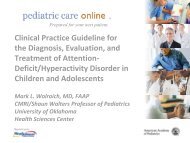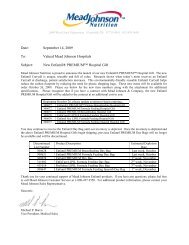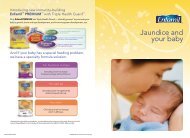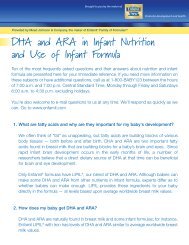LB2882MaternalNutriti+ - Mead Johnson Nutrition
LB2882MaternalNutriti+ - Mead Johnson Nutrition
LB2882MaternalNutriti+ - Mead Johnson Nutrition
You also want an ePaper? Increase the reach of your titles
YUMPU automatically turns print PDFs into web optimized ePapers that Google loves.
Preconception Care<br />
In 2005, the WHO’s World Report 2005: Make Every Mother and Child Count detailed the importance of<br />
preconception care and indicated that reproductive health is an essential element of the continuum of maternal and<br />
child health. It called for reform of programs and interventions at the country and international level. 1 Since 2005, a<br />
number of programs and guidelines have been revised or developed but they vary in scope and content due to a<br />
number of factors including the type of health care system, level of economic support, political, cultural, and religious<br />
beliefs of the locale. Despite the differences in the programs and guidelines, the concept of preconception care<br />
remains a critical component of maternal and child health promotion globally. 57<br />
The US Centers for Disease Control and Prevention has issued recommendations on preconception care for<br />
women. 2,58 The recommendations include screening for health risks that could affect the outcome of a future<br />
pregnancy. Many of those risks, such as obesity, poorly-controlled diabetes, and inadequate diet are amenable to<br />
positive lifestyle changes. Women should be counseled regarding the benefits of physical activity, achieving a healthy<br />
weight prior to pregnancy, avoiding food faddism, consuming adequate folic acid, and controlling preexisting medical<br />
conditions, such as diabetes, along with other factors that influence pregnancy outcome. 2 Pregnancy preparedness<br />
is wise even when a woman does not plan to conceive since many pregnancies are unintended. For example, in the<br />
United States, an estimated 50% of pregnancies are unintended or mistimed. 59 During the first seven to eight weeks<br />
of pregnancy, when women may not realize they are pregnant, a developing fetus is highly susceptible to congenital<br />
anomalies and other adverse outcomes as a result of exposure to alcohol, tobacco and other drugs, workplace<br />
hazards, and inadequate intake of essential nutrients, such as folic acid. 60<br />
NUTRITION DURING PREGNANCY AND LACTATION<br />
Pregnancy Weight Gain Guidelines<br />
Starting pregnancy with a healthy weight and gaining appropriately during pregnancy typically translates into a lower<br />
risk of complications for mother and child. 3 However, women who are attempting to lose weight prior to conception<br />
should stop once pregnancy has occurred.<br />
Weight-gain and weight-monitoring recommendations during pregnancy vary around the world. 4 Many countries<br />
in Europe, for example, do not weigh pregnant women after their first antenatal visit, 4 while others have developed<br />
population-specific pregnancy weight-gain curves based on research of weight gain and pregnancy outcomes in their<br />
countries. 61,62 In 2004, the Report of a Joint FAO/WHO/UNU Expert Consultation on human energy requirements 6<br />
stated,<br />
“This consultation endorsed the WHO recommendation that healthy, well-nourished women should gain 10 to<br />
14 kg [22 to 30.8 pounds] during pregnancy, with an average of 12 kg [26.4 pounds], in order to increase the<br />
probability of delivering full-term infants with an average birth weight of 3.3 kg, and to reduce the risk of foetal<br />
and maternal complications.”<br />
According to the Expert Consultation, underweight women (with a BMI 25 may benefit with weight gains near the lower end of the range. 6<br />
In 2009, the Institute of Medicine (IOM) in the United States updated its guidelines for weight gain during pregnancy<br />
as a result of rising obesity rates in women, the large proportion of women with high gestational weight gain, and the<br />
strength of the evidence linking gestational weight gain to certain adverse outcomes. 3 The 2009 recommendations<br />
are an attempt to balance the risks and benefits associated with gestational weight gain for both the mother and<br />
child. The IOM stated that while the guidelines are intended for use in the United States, “They may be applicable to<br />
7

















